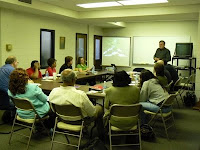Megachurches have developed several new patterns of cooperation. As writer John Dart explains in his article in The Christian Century:
“[M]ost supersized churches want the freedom to customize their programs and avoid bureaucratic delays. . . . Megachurch leaders find resources for adult education, youth programs and for hiring an experienced and successful pastor ‘without ever needing a denomination or seminary, board of missions or other baggage of hierarchical institutional structures.’” (The quote is from Scott Thumma of Hartford Seminary.)
This approach presents a challenge to the survival of denominations, mission boards, and seminaries, and the responses from those entities vary. Although some of these institutions label the strategy of the megachurches as a fasting fad, others realize that it is part of a new way of doing church that will be with us for many years to come.
Seminaries are especially challenged to come up with new ways to partner with these megachurches. Why should they bother? Let me suggest several reasons.
First, most theological schools acknowledge that their primary mission is to prepare leaders for the local church. If they are to continue to pursue that purpose, they must find ways to relate to all types of local churches—traditional, megachurch, emerging, and organic models. The seminary does not define the church; in reality, the seminary serves the church. The seminary has some obligation to follow the church’s lead.
Second, theological schools and their faculties have the experience and expertise that the churches need, whether the churches realize it or not. When properly pursued, a seminary education provides the student with values, attributes, and skills to be an effective church leader, Seminaries are finding more effective ways to tell their stories and to share their successes in training leaders who can function effectively in the contemporary church environment.
Third, seminaries are adaptable. They are adopting new delivery systems and seeking new partners in order to carry out their mission. As denominations provide less and less financial support for the institutions they birthed (and which, in many cases, still bear their denominational tag), seminary leaders are finding friends among churches and individuals and developing programs to meet the needs of particular churches. This may be as simple as developing internships with local congregations or as complex as providing internal ministerial formation. In these partnerships, the church benefits from the expertise of the seminary and the seminary benefits from the resources of the congregation.
New situations call for new strategies. Mission is primary. Theological education will survive, but it will look very different.
http://www.christiancentury.org/issue.lasso
“[M]ost supersized churches want the freedom to customize their programs and avoid bureaucratic delays. . . . Megachurch leaders find resources for adult education, youth programs and for hiring an experienced and successful pastor ‘without ever needing a denomination or seminary, board of missions or other baggage of hierarchical institutional structures.’” (The quote is from Scott Thumma of Hartford Seminary.)
This approach presents a challenge to the survival of denominations, mission boards, and seminaries, and the responses from those entities vary. Although some of these institutions label the strategy of the megachurches as a fasting fad, others realize that it is part of a new way of doing church that will be with us for many years to come.
Seminaries are especially challenged to come up with new ways to partner with these megachurches. Why should they bother? Let me suggest several reasons.
First, most theological schools acknowledge that their primary mission is to prepare leaders for the local church. If they are to continue to pursue that purpose, they must find ways to relate to all types of local churches—traditional, megachurch, emerging, and organic models. The seminary does not define the church; in reality, the seminary serves the church. The seminary has some obligation to follow the church’s lead.
Second, theological schools and their faculties have the experience and expertise that the churches need, whether the churches realize it or not. When properly pursued, a seminary education provides the student with values, attributes, and skills to be an effective church leader, Seminaries are finding more effective ways to tell their stories and to share their successes in training leaders who can function effectively in the contemporary church environment.
Third, seminaries are adaptable. They are adopting new delivery systems and seeking new partners in order to carry out their mission. As denominations provide less and less financial support for the institutions they birthed (and which, in many cases, still bear their denominational tag), seminary leaders are finding friends among churches and individuals and developing programs to meet the needs of particular churches. This may be as simple as developing internships with local congregations or as complex as providing internal ministerial formation. In these partnerships, the church benefits from the expertise of the seminary and the seminary benefits from the resources of the congregation.
New situations call for new strategies. Mission is primary. Theological education will survive, but it will look very different.
http://www.christiancentury.org/issue.lasso

Comments